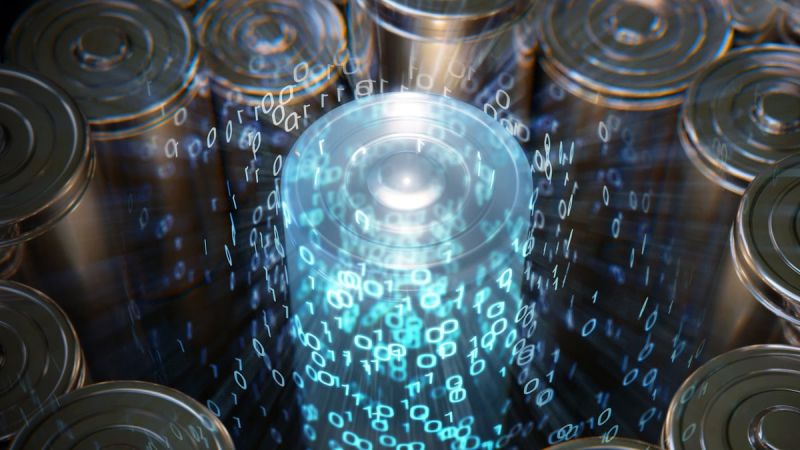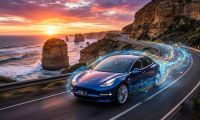15 years ago the most car companies laughed at electric cars. Today, most car companies have joined or are joining the game. There is no doubt the EV revolution is happening right before our eyes.
Battery technology is something that has been on the mind of large car manufacturers and environmentalists. Mining lithium has many people concerned that if this is the direction EV is headed, they do not want any part.
The wheels are in motion, and the industry is changing to where the future is the electric and other alternative-fueled vehicles.
So, if lithium is super horrible to the environment, what are the alternatives? Well, we have hydrogen, but in minimal numbers. A more promising bit of tech is solid-state. I have come up with three good ways that this tech will be the evolutionary bump we have been waiting for. Check it out.
Way One Solid-State Will Change The Industry
The biggest reason more people have not adopted an EV is the charge time. I do not care who you are; you have to plan your trip around charging is inconvenient. Is there anything wrong with planning your trip? No, there is not, but 45 minutes to wait for a partial charge is a lifetime if you want to get to your destination.

Solid-State is proving that long charge times will be a thing of the past. Testing from multiple resources such as Samsung and other companies has shown that slow charge times are a thing of the past.
Once charge times are reduced to a regular gasoline pit stop, it is game over.
Way Two Solid State Will Change The Industry
Have you ever seen a Tesla catch fire or a Chevrolet Volt, for that matter? Yeah, Lithium-ion battery tech, if it ruptures, is a thermal nightmare.

Solid-state, on the other hand, is far safer. With a solid electrolyte, there is not the same risk of thermal detonation as Lithium-ion. Once again, a game-changer for the automotive world. Safety is at the top of the list of every car maker on the planet and having the safest battery is a no-brainer.
Way Three Solid State Will Change The Industry
The cost of a Tesla and other EV's out there have come way down. As technology continues to improve, we should see a price drop, but this is not the only reason it will change the industry.
One of the reasons that big companies have begun to phase out battery tech like NiMH (nickel-metal hydride) is because there is no reason to keep developing it. It is ancient technology and cannot do what modern lithium-polymer does.

The cool thing about solid-state is that it is even better than the best lithium tech. It is at its core lithium technology, but it is even more energy-dense than the best lithium polymer available today.
Once you can tell your customers, they can go over 600 miles on a charge utilizing A/C and cruising at 80 mph while pulling the family trailer; well, you get the picture.
Conclusion
My educated opinion is that solid-state batteries will completely change the way we do everything in our lives. Once people became mobile with the automobile, everything changed, and nothing seems impossible. We are on the brink of the next wave of change, and most do not even realize it.
Solid-state is better in every way compared to any battery currently on the market today. It will be cheaper to produce, have more energy, safer all around, and charge ultra-fast.
The only thing we need to do now is to wait and watch it all unfold.
Thank you all for reading; I appreciate the opportunity to share my knowledge with you as an audience. I look forward to seeing you in the next article.
Have you had a hard time getting a replacement catalytic converter? This could be the reason why.
Check out this wild new battery tech that Tesla has and why it will forever change the auto industry.
Peter Neilson is an automotive consultant specializing in electric cars and hybrid battery technologies. He holds a Bachelor of Science in Automotive Service Technology from Weber State University. Peter can be reached on Linkedin and you can tweet him at The_hybrid_guy on Twitter. Find his page on Facebook at Certified Auto Consulting. Read more of Peter's stories at Toyota news coverage on Torque News. Search Toyota Prius Torque News for more in depth Prius coverage from our reporters.
Set Torque News as Preferred Source on Google












Comments
Well, you bought into the
Permalink
Well, you bought into the hype. Solid state batteries promise to improve on current battery technologies. But they are not being mass produced yet. And right now we don't know when (or if) the solid state batteries can be scaled to mass production, and be cost effective and long lasting. Your points of argument are not great. Charging time is not the crisis that the press makes out for most EV owners. Most people just plug their car in, and while they sleep the car recharges overnight. Today's long range of 250-300 miles is overkill for most people's daily use, with the average daily commute being around 30 miles. The Lithium battery fire issue is an exaggeration at least, and a lie at the worst. Do you consider your gas powered car a fire hazard? Because there are over 150 automotive gas fires every single day, which is probably more than ALL of the Tesla and Volt fires combined over the last 12 years. So it's another "exaggeration". And most of the expensive and toxic chemicals in Lithium batteries are also in solid state batteries. Plus in the years that it takes to scale up solid state production, Lithium Ion battery production will move beyond most all of it's current problems. Tesla has a lithium refining process that involves mixing clay with table salt and then adding water. The company said the process causes a reaction where the salt would leach out with lithium, and the lithium then would be extracted. The leftover clay would be put back in the ground to mitigate environmental damage, much like the current mining industry practice of returning rock to the earth after minerals are extracted. Solid state battery technology is not the enemy of lithium ion batteries. It represents a hope that (along with several other battery technologies) will compete to reduce the world's great dependence on fossil fuels (oil/gas). I will be happy to see solid state batteries get out of the research lab and into cars and consumer electronics, but I am not expecting to see anything soon.
The reason you see 150 gas
Permalink
In reply to Well, you bought into the by DeanMcManis (not verified)
The reason you see 150 gas autos catch fire everyday compared to ev vehs is because there are billions of gas vehs compared to ev vehs.
Even figuring for the larger
Permalink
In reply to The reason you see 150 gas by Rod (not verified)
Even figuring for the larger number of gas vehicles, there is over 10 times the likelihood of a fire in a gas vehicle than an electrical vehicle.
I have zero interest in EV's
Permalink
I have zero interest in EV's with the current batteries because they're too costly, too heavy, recharge too slowly, and lack range. The best place for the current batteries is in hybrids and PHEV's, which need much smaller batteries. Hybrids and PHEV's hide the faults of these batteries while taking advantage of their assets. Charging stations can be ignored and gas station visits can be minimized, especially with big-battery PHEV's with an electric-only range exceeding 25 miles.
I'm hoping Toyota wins the solid-state battery race. My ultimate goal is to own a reasonably priced EV with a solid-state battery. There would have to be enough charging stations capable of 10-minute recharges wherever I plan on traveling, though. Until then, my focus is on Toyota and Lexus PHEV's that have specs similar to those of the RAV4 Prime. I'd prefer to see that equipment put in a Toyota or Lexus sedan, but would settle for an SUV if Toyota decides to limit the Prime family and focus more on EV's.
Yeah, those are exactly the
Permalink
In reply to I have zero interest in EV's by Al D (not verified)
Yeah, those are exactly the standard arguments against batteries, but they are getting weaker over time as battery technology improves. You say that batteries are too costly, but if their cost is included in the car and the car costs about the same as other cars what does it matter? The average new car price in the U.S. is $38K, which is the same as the entry level Tesla Model 3 and most EVs with the tax subsidy. That same Model 3 SR weighs 3800lbs, which is also comparable to most mid sized, European, near-luxury cars, and that Lexus that you like. Recharging too slowly is a misnomer for most EV owners because they just fully recharge at home, overnight. Plus, you are fine with having a 25 mile daily EV range, and yet 250 miles is not enough? I like PHEVs too (and have one as my daily driver) but my next car will be an Aptera BEV.
Going from 2000 plus moving
Permalink
Going from 2000 plus moving parts to 200 plus moving parts.
No noise, no poison gas, no exhaust, no radiator, no water pump, no anti freeze, way way less servicing......
No drive shafts...
That assertion about time to
Permalink
That assertion about time to recharge while on a road-trip feeds a misconception. Many will argue (know your audience) it isn't the biggest reason for not adopting EV tech. When we do our 700-mile drive to see the kids, concern is about being able to find a spot to recharge... not how long it will take.
In other words, we take an hour-long break during the trip anyway. We need to eat, stretch, and take a mental break. Having a fast-charger available when we pull into the parking lot ranks top priority. It doesn't need to be superfast. It just needs to be there for us to immediately use.
In other words, I'm pointing out that a large bank of 50kW chargers is far more important than a handful delivering power faster. A vehicle able to accept the 50 kW rate the entire duration would end up with 50 kW of electricity during that hour we spend in the restaurant. At a consumption-rate of 3.5 kWh/100mi, that's 175 miles of capacity. (Non-Highway travel would provide greater distance, since slower is more efficient.)
Knowing this, ask yourself how often someone takes a road-trip with all-day driving. You'll notice that example is uncommon. It happens, but no where near as often as the "biggest reason" seems to imply. Waiting at a guaranteed recharge location, with plugging in available immediately, is far more important than the supposed "lifetime" that was asserted.
I do not think we are ready
Permalink
I do not think we are ready to stop every 3 hours for refueling and for about an hour each time. Also we need to consider the immense increase in demand for electricity in a very short time even as we must have huge increases to charging stations. We also see need to understand that someone actually pays for the government rebates directly or indirectly in an already monster of national debt including likely the car buyer but indirectly over time as they pay taxes. Also the current disposal of batteries is problematic and not solved for any large scale.